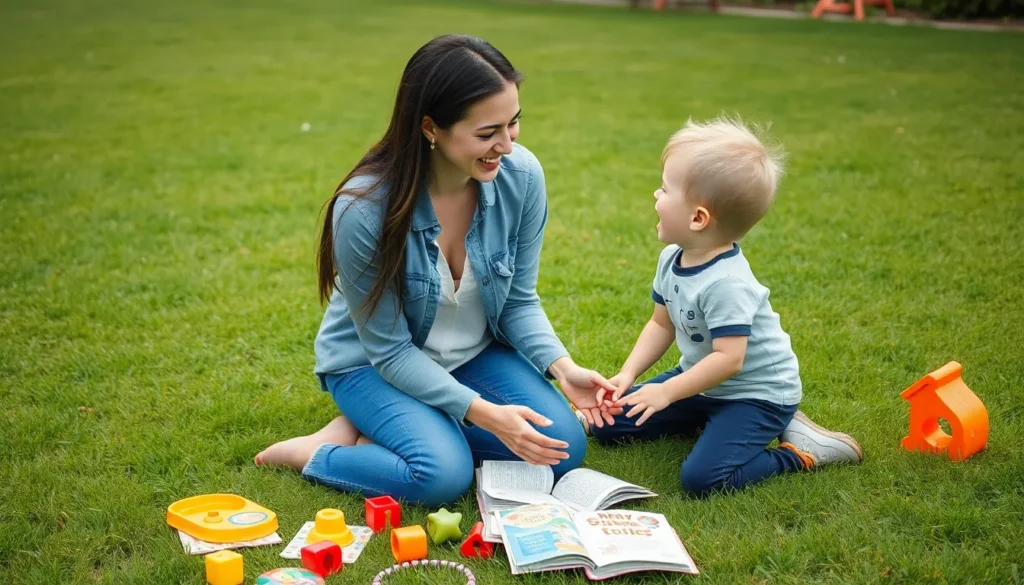Table of Contents
ToggleParenting isn’t for the faint of heart. It’s a wild ride filled with sleepless nights, endless laundry, and the occasional tantrum that could rival a Broadway performance. Yet, amidst the chaos, effective parenting can turn those moments of madness into opportunities for growth. It’s not just about keeping kids alive; it’s about raising confident, resilient humans who can tackle the world with a smile (and maybe a snack or two).
In a world where parenting advice comes from every corner—social media, family gatherings, and that one overly opinionated neighbor—finding what truly works can feel like searching for a needle in a haystack. But fear not. With the right strategies and a dash of humor, anyone can become a parenting pro. Let’s dive into the essentials of parenting effectiveness and discover how to navigate the delightful, if sometimes chaotic, journey of raising kids.
Understanding Parenting Effectiveness
Parenting effectiveness involves skillful interactions that promote healthy emotional and social development in children. Identifying strategies that foster these interactions is essential for positive parenting outcomes.
Definition and Importance
Parenting effectiveness refers to the ability to raise children in a way that promotes their well-being and development. It leads to emotional stability, social competence, and academic success. Effective parenting includes using appropriate discipline, providing emotional support, and encouraging independence. Prioritizing children’s needs creates a secure environment where they thrive. Research indicates that effective parenting techniques correlate with better behavioral outcomes, illustrating how crucial these strategies are in shaping children’s future.
Factors Influencing Parenting Effectiveness
Multiple factors impact parenting effectiveness. Individual parenting styles, such as authoritative, authoritarian, or permissive, each shape outcomes differently. Parent-child relationships, characterized by communication and trust, significantly affect children’s behavior. External factors, like socioeconomic status and cultural influences, also play a role in shaping parenting practices. Access to resources, such as education and support networks, enhances a parent’s ability to implement effective strategies. By recognizing these influences, parents can adjust their approaches to foster resilience and confidence in their children.
Strategies for Improving Parenting Effectiveness

Effective parenting requires specific strategies to foster children’s emotional and social development.
Communication Techniques
Open dialogue builds trust between parents and children. Encouraging children to express their feelings promotes emotional intelligence and understanding. Active listening plays a crucial role in validating children’s experiences. For instance, summarizing what a child says shows that their thoughts matter. Asking open-ended questions encourages deeper conversations, allowing children to explore their feelings further. Clarity in communication helps children understand expectations and feelings. Instead of issuing commands, using “I” statements helps express feelings without assigning blame. Using consistent language reinforces key messages to children, aiding comprehension and retention.
Setting Boundaries and Expectations
Establishing clear boundaries provides children with a sense of security. Guidelines should be specific, age-appropriate, and consistent to ensure understanding. Parents must communicate expectations clearly so children know what is acceptable behavior. Using positive reinforcement strengthens desired behaviors. For example, praising children when they follow rules can motivate them to repeat those behaviors. Setting consequences for not meeting expectations teaches accountability. Flexibility in boundaries accommodates individual child needs while maintaining core values. Regularly reviewing and adjusting boundaries as children grow encourages independence and responsibility.
The Role of Emotional Intelligence
Emotional intelligence plays a crucial role in effective parenting. It enables parents to understand and manage their own emotions while also recognizing and responding to their children’s feelings.
Empathy in Parenting
Empathy forms the cornerstone of nurturing relationships. Parents who show empathy help children express and process their emotions. Children learn emotional regulation and social skills through this empathetic approach. Active listening fosters a safe environment for children to share their feelings. Showing understanding during conflicts also cultivates a deeper trust between parent and child. Through modeling empathetic behavior, parents teach kids to consider others’ perspectives, enhancing their social competence. Consistent empathy during parenting strengthens relationships and builds resilient children.
Managing Stress and Emotions
Managing stress effectively leads to healthier family dynamics. Parents who practice emotional regulation model appropriate responses to challenges. Utilizing mindfulness techniques helps maintain calm during parenting conflicts. Teaching children stress management strategies equips them to handle their emotions constructively. Open conversations about feelings foster an atmosphere where everyone feels safe discussing their stressors. These techniques also encourage parents to reflect on their emotions, promoting healthier interactions. Proactively managing stress sets a positive example, guiding children toward emotional stability.
Cultural Perspectives on Parenting Effectiveness
Cultural influences significantly shape parenting effectiveness across different societies. Variations in values and traditions impact parenting styles, leading to distinct approaches.
Variations in Parenting Styles
Diverse cultures practice various parenting styles, including authoritative, permissive, and authoritarian. Authoritative parenting, characterized by warmth and structure, often yields positive outcomes in children, promoting autonomy and social competence. Permissive styles, which prioritize freedom, may result in less self-discipline among children. Conversely, authoritarian approaches enforce strict rules but can hinder emotional development. Countries like Japan emphasize collectivism, fostering strong family bonds and community support. In contrast, Western cultures often value independence, encouraging children to express themselves. Recognizing these variations helps parents adapt their strategies to fit their cultural context, improving overall effectiveness.
Impact of Societal Norms
Societal norms play a crucial role in shaping parenting practices and expectations. Communities influence what constitutes effective parenting, impacting aspects like discipline, communication, and social interaction. Societies with strong emphasis on education often encourage parents to prioritize academic success and structured activities. In contrast, cultures focusing on emotional health may promote nurturing and open communication within families. Additionally, the rise of technology has altered norms around parenting, presenting new challenges and opportunities for engagement. Understanding these societal influences enables parents to navigate their children’s upbringing more effectively, aligning practices with shared cultural values.
Parenting effectiveness isn’t just a goal; it’s a journey that shapes the lives of both parents and children. By embracing strategies that foster emotional intelligence and resilience, parents can create a nurturing environment where children thrive.
Understanding the nuances of individual parenting styles and cultural influences equips parents to adapt their approaches for better outcomes. With open communication and a focus on emotional regulation, families can navigate challenges together.
Ultimately, effective parenting is about building strong relationships that promote growth and well-being, ensuring children develop the skills they need to succeed in life.







